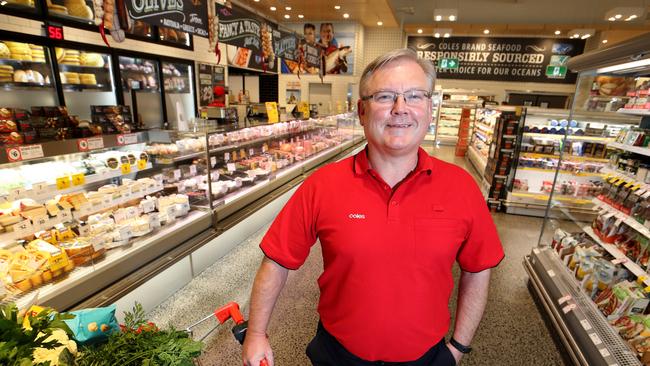
Stainless steel chef knives, together with upmarket home brand food, will be part of the Christmas cheer at Coles this year, with the company launching its festive range at Wednesday’s Global Food Forum.
Home cooking has exploded during the COVID-19 lockdowns, with sales of so-called pantry items such as flour and cooking oil up 20 per cent this year.
Chief executive Steven Cain unveiled the retailer’s offering as part of an upmarket brief on the retailer’s prospects.
He noted that while sales of basics like flour were up, so were champagne and upmarket cheese because people, stuck at home with no restaurants to go to, were treating themselves. That explains the Christmas push towards upmarket food items.
The knife offering follows the successful wine glass promotion last year with customers earnings loyalty points per dollar spent and this quickly translates into high-quality chef knives.
Cain warned that the company was facing some supply issues due to ongoing delays at the nation’s wharves, with some cooking products, such as herbs and spices and also beauty items, stuck in containers.
The Coles boss said this year’s federal budget had something for everyone, but noted that consumer confidence varied across the market.
He talked up the upcoming transfer of online shopping through the Ocado operation, which is being rolled out in 2023, and will come with not only a more efficient delivery system but increased product choice with the UK offering 50,000 stocktaking units, more than double the 20,000 units on sale in a supermarket. This is a boon for suppliers, with regional producers, who may not get on the supermarket shelf, able to sell their wares through Coles online.
Online sales now account for 6 per cent of Coles sales, which is half the UK’s levels, but the global boom earlier this month propelled UK-based Ocado to a higher market value than global giant Tesco.
Coles now exports $500m worth of meat each year to 40 countries and will shortly add wine to its export offering.
The retailer is working directly with suppliers of milk, with dairies across the country now contracted directly to Coles with an independent processor collecting and packing the output.
House brand label sales will feature heavily on the Christmas promotions list as part of Cain’s efforts to boost them to more than 40 per cent of total items sold in the supermarket — up from the present 31 per cent.
Mullen’s Telstra update
Telstra’s stock price increased 4.3 per cent to $2.90 on Tuesday, in the wake of chairman John Mullen’s strong support for a continued dividend around existing levels of 16c a share — if the company can achieve $7.5bn-$8.5bn in earnings.
The trick is to get there, because the company is forecasting this year’s earnings to fall just below that level, even with the continued $1bn-a-year handout from the NBN.
Mullen again noted that the loss of monopoly rent on the company’s fixed-line assets to NBN had cost the company $3.5bn in earnings before interest, tax, depreciation and amortisation, but failed to mention NBN would continue to pay Telstra $1bn in rent for its ducts and other services for at least the next 30 years.
That commitment, which amounts to about 15 per cent of Telstra’s earnings locked in, strangely did not feature prominently in Telstra’s commentary.
Telstra’s infrastructure division, exchanges, mobile towers and ducts, etc, last year reported earnings of $2.8bn which, based on market multiples of 12 times, would be valued as much as all of Telstra is today ($33bn).
That explains why Mullen is talking up the prospects of selling some of the assets at year’s end to realise some of that value.
In the longer term, he said the company would be an ideal partner for the NBN, which he didn’t say would only happen if Telstra sold the division so it was at an arm’s length to the company.
BHP faces heat
The Australasian Centre for Corporate Responsibility has scored some hits against BHP for membership of environmentally unfriendly industry lobby groups, but its motion in favour of the First Nations Protection Alliance has split its supporters.
Still, BHP, like the rest of the industry, is still dealing with the aftermath of the Rio Tinto disaster in the Juukan Gorge.
Rio’s mismanagement has meant other miners were subjected to increased political scrutiny, as the proposed resolution (now withdrawn) from Wednesday’s annual meeting had shown.
The bottom line is a motion requesting BHP put a moratorium on new development pending the passage of proposed WA legislation was withdrawn and BHP chairman Ken MacKenzie has agreed to work with the alliance to strengthen “free, prior and informed consent in agreement making, PBC funding, cultural mapping and support for national and state cultural heritage legislative reform”.
Different groups have taken different attitudes with the Karlka Nyiyaparli Aboriginal Corporation rejecting a view that traditional owners believed BHP had failed to deliver on past promises.
Both BHP and ACCR managed to find friends on either side of the issue to support their case.
It seems some of the company’s traditional owners are backing its view on the company, which is good for BHP but not necessarily reflective of the wider Indigenous community.
Alliance co-chair Kado Muir said in a statement “the First Nations Heritage Alliance would like to thank ACCR for the invaluable support it has given to the alliance in relation to the resolution to BHP. At all times they have acted in good faith, with integrity and on best advice from the alliance. ACCR’s has been crucial in achieving this positive outcome with BHP.”
The issue highlights the careful path both sides again need to walk.
Crown director race
Three crown directors, including James Packer offsider Guy Jalland, face a tough time being re-elected at the company’s annual meeting late this month.
The three directors up for re-election are Jalland, former public service chief Jane Halton and deputy chairman John Horvath, a former federal chief medical officer.
Ownership Matters, which is a key adviser to industry funds, has opposed the re-election of all three directors on governance concerns — as has ACSI.
CGI Glass Lewis is recommended in favour of all three directors, and with the proxy firms split the vote will be close.
The company’s governance has copped a slamming in the present NSW inquiry into its Barangaroo licence.
Former chairman John Alexander has decided not to stand for re-election. Horvath has served on the board for 10 years, which is usually considered time enough for any director.
Both Halton and Jalland are relative newcomers, although Jalland is a long-time adviser to major shareholder Packer.
The board presently has 10 people, so the defeat of three directors would require major changes to the board at a difficult time for the company.
In CBA’s case, ISS was the only proxy house against the company’s remuneration report and a $1.6m equity grant to CBA chief Matt Comyn. As forecast both were approved, but the 21 per cent vote highlights the power of ISS, which tends to be followed by offshore passive fund managers.






